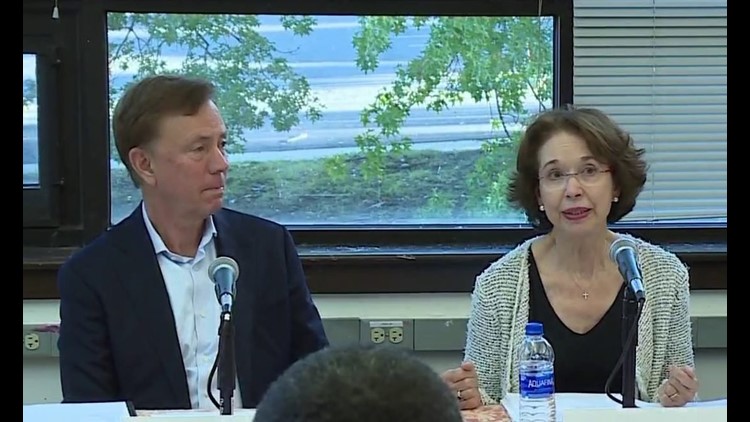NEW HAVEN — The board of directors overseeing a new public-private nonprofit dedicated to helping Connecticut students in struggling school districts made assurances Friday their activities will be made public, but a group of parents remained unconvinced. They are calling for the repeal of a “secret deal” that exempted the organization from state open records and meetings laws.
Gwen Samuels, founder of the Connecticut Parents Union, said her organization has begun a petition drive to demand the General Assembly reverse legislation exempting the Partnership for Connecticut.
“We have children that have dreams who are in juvenile justice systems, right? Because we have a broken educational system. I get it. But you don’t get the luxury of doing it in a vacuum. You don’t get the luxury of doing it secretly,” said the Meriden mother. “We support the deal. We oppose the secret. That is why we are saying repeal the secret deal.”
Friday marked the first public meeting of the partnership’s new board of directors, which will oversee a $100 million contribution from the foundation of Barbara and Ray Dalio, founder of the world’s largest hedge fund, Bridgewater Associates; and $100 million in matching state taxpayer funds over five years. State legislation creating the entity also calls for another $100 million from other yet to be named philanthropists and business leaders.
Friday’s meeting focused mostly on organizational matters, such as approving an initial operating budget, electing officers, approving bylaws and discussing a planned CEO search. While some opening comments were made during a public session, the largest portion of the meeting occurred during a closed, executive session.
Democratic Gov. Ned Lamont, a wealthy former businessman, has been working with Barbara Dalio since early 2019 on this effort with Dalio Philanthropies in Connecticut, a state with a large education achievement gap between wealthy and poor communities. The goal is to help “disengaged and disconnected” young people living in poor Connecticut communities, who have dropped out of high school or who are at risk of dropping out, to succeed. The first grants aren’t expected to be issued until sometime next year.
Lamont acknowledged Connecticut is “trying something new” with this public-private concept. But he and Barbara Dalio, who is also a board member, have said exempting the partnership from public disclosure rules will allow the board to have more sensitive conversations.
But Lamont and Barbara Dalio also insisted the public will be informed of the group’s actions, noting Friday’s votes were taken in public.
“We’re a new partnership. It’s a public-private partnership. We wanted to make all these votes in public so people knew exactly how we’re operating in a very clear way. I think we did that,” said Lamont, adding how it was appropriate for the group to discuss a planned CEO search in private. “I think we, as the public members, people look to us to make sure we explain what we’re doing, why we’re doing it and how it benefits the kids here in Connecticut.”
Barbara Dalio said she understood the public’s concerns about how the money will be spent, but said all expenditures will be made public.
“We have a website. That’s how we also deal with the foundation,” she said. “Everything, every donation is public. Everything will be right there. Every grant.”
Democratic House Speaker Joe Aresimowicz of Berlin defended the decision by lawmakers to exempt the partnership, arguing a public-private entity may be what’s needed to finally address Connecticut’s achievement gap problem.
“I’ve been up at the state Capitol for 16 years and the deliberations you see in public is nothing more than pandering to peoples’ base. This issue has been troubling the state of Connecticut for almost 50 years. It’s about time we have honest discussions, free of political consequences,” he said. “I think what we’re doing is very different from what we’ve seen before.”
But in a statement issued Friday, the president of the Connecticut Council on Freedom of Information insisted the partnership needs to do its business in the open and called for legislation next year that requires the entity to abide by open government laws.
“This is not simply a question of complying with the letter of our FOI statutes that require open meetings and public access to decision-making,” said Mike Savino. “It begs the question of why our elected leaders and this private foundation believe they need to do business in secret to advance education reform.”



